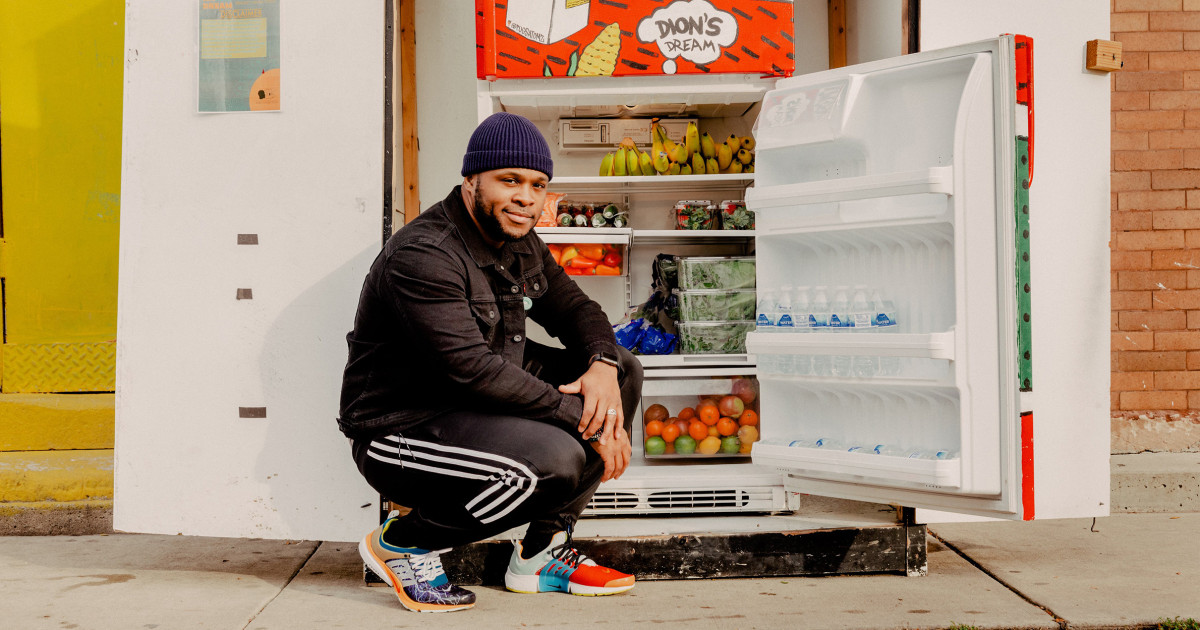
In the year since Victoria Jayne placed four community refrigerators across Philadelphia with free food, she has been amazed at how quickly they empty out. And hungry Philadelphians seem to be picking up food at every fridge they can find: in front of a medical office, by an art space, next to an apartment building and even by a playground.
“The fridges, they roll over completely every eight hours,” she said. “You put something in at night. You show up the next morning and it’s gone.”
The fridges are just a handful of the vast network of ever-expanding community food hubs that have been started across the country, in cities big and small.
During the coronavirus pandemic, as the economy has been upended and demand at food banks has continued to surge in many places, so, too, has local food activists’ desire to create small locations where anyone can pick up a few items at any time with no questions asked.
While the concept has existed for many years, the pandemic has inspired the creation of hundreds of new free fridges across dozens of cities over the last 18 months and made them something that is here to stay.
Ernst Bertone Oehninger, who runs freedge.org, an online list of free fridges worldwide, estimates conservatively that the U.S. has 400 free fridges and that nearly all of them have been created in the past 18 months.
The fridges only continue to proliferate, and some are breaking out into different business models and offering other products.
A fridge project in Chicago is not only providing food for pickup but also preparing free produce boxes for local delivery. Another group, in Washington state, offers not just food but also health-related products. A food bank in suburban Boston has expanded its traditional brick-and-mortar offerings to include a free fridge, set up in front of a dry cleaners. And a fridge project in Los Angeles offers bedding and other camping-related items for homeless communities desperate to stay warm.
“It takes a tapestry of programs and approaches to eliminate the multifaceted problem of hunger in the United States, and community refrigerators for sure can play an important role,” said Diane Whitmore Schanzenbach, an economics professor and poverty expert at Northwestern University, who is on the board of the Greater Chicago Food Depository.
How they work
Free fridges generally operate by some version of a fairly straightforward motto: “Take what you need and leave what you can.”
The goal is to provide reliable locations for people to get something to eat, particularly in neighborhoods that experience high rates of poverty.
“We have people who go grocery shopping and leave some extras,” Jayne said.
Some free fridges around the country, sometimes called “freedges,” run on donated groceries. Others operate more on cash donations, which are used to buy food to give away.
The South Philadelphia Community Fridges rely primarily on donations of staples like cooking oil, coffee, cereal and other items from food banks, grocery stores, nonprofit organizations and individuals. In addition, the group takes in thousands of dollars in donations a month.
Small but mighty
Few people running free fridges have any illusions that they can make a vast, substantive impact on a national scale. But every little bit helps.
A report released this year by the Agriculture Department found that over 10 percent of U.S. households, or nearly 14 million people, remain food-insecure.
More than 1.3 million people face hunger in Pennsylvania as a whole, according to Feeding America, a nonprofit national food bank organization. Philabundance, Philadelphia’s largest food bank, distributed more than 55 million pounds of food last year, serving more than 135,000 people a week.
Food policy experts say that even a four-location network of fridges, like those across south Philadelphia, can have a tiny but positive impact. One of the many benefits is that most free fridges never close, unlike food banks and pantries that have set distribution hours.
Jayne said community-building is a critical part of the work she and the dozens of other volunteers do.
“People need to eat. That’s really all there is to it,” she said. “It’s important to me that my neighbors’ needs are being met.”
Kristin Guerin, who started her first free fridge in Miami over a year ago, recognizes that free fridge organizers’ efforts are minuscule compared to the scope of the problem. But she is proud of the small effort she has made to mitigate hunger.
“A large part of the work that we have to refocus on is to counter that work to make sure that we are working for long-term change,” she said. “Community fridges are a Band-Aid. The ultimate goal is to end food insecurity.”
Different models
While the Philadelphia network of always-open fridges is one model, another model operates in the Englewood neighborhood on the South Side of Chicago, where Dion’s Dream Fridge is open seven hours a day, five days a week.
The fridge is run by Dion Dawson, 30, who said he began his location across the street from a playground just over a year ago. The organization primarily takes cash donations but not food giveaways, and it prefers to buy food from retailers. Dawson said that unlike most single fridges or networks of fridges, his group is a 501(c)(3) nonprofit organization that has grown in the past year from a $20,000 budget to a $300,000 budget.
“We realized that we would have to fill our fridge with brand new produce so we can stabilize the quality and be sure it’s as impactful as it possibly could be,” he said. “From there, since September 11, 2020, we have stocked our fridge every day. We don’t take donations or mutual aid.”
Source: | This article originally belongs to Nbcnews.com










